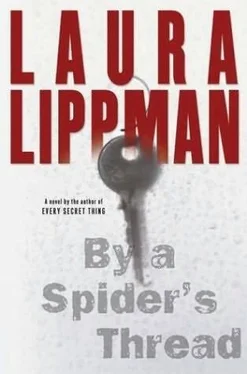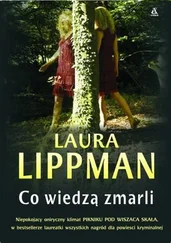Luckily, Tyner knew a Cumberland lawyer willing to safeguard their rights on short notice. Tess had learned through sorry experience that there was no percentage in talking to authorities without a lawyer present, especially when she was innocent. The lawyer arrived quickly, and by the time the sun went down over West Virginia, the sheriff had decided to let Tess and Mark Rubin leave, although he reminded them that they would be expected to return for grand jury proceedings. ButTyner's friend said she knew the state's attorney and he was likely to recommend no indictment under the circumstances. Tess and Mark were licensed gun owners on legitimate business, and their stories meshed with the physical evidence at the scene.
"It would have been better," said the lawyer, Gloria Hess, "if you hadn't gone inside his house after you shot him. But I still think you'll both be okay."
She was a tall, striking brunette, gorgeous enough so that even Mark seemed to register the fact, shaking her hand with a faintly dazed look. It occurred to Tess that Tyner's legal contacts all tended to be lookers.
"I had to call 911, and it's hard to get service on my cell out here," Tess told Gloria. "You have to admit, Greif's behavior made more sense after the deputies saw what was in his house. Clearly it wasn't trespassing he was worried about."
The deputies had opened a closed door off the central hallway and discovered a state-of-the-art forger's shop, with a gleaming photocopier and templates for all sorts of documents-temporary tags, titles, driver's licenses. There also were meticulous files, kept in restored oak filing cabinets, showing price lists for certain parts and in-demand vehicles, broken down by region. Another folder yielded voluminous correspondence about firearms, but this appeared to be legal-up to a point. Greif was the registered owner of hundreds of handguns, but the only weapon the deputies turned up was the shotgun he had died holding.
The deputies were impressed by their find, so Tess had pretended to be, too, despite having seen it all, and more. She wished she had thought to shut down Greif's computer-with the flick of a finger, the deputies could have traced her frantic path through it in the minutes before they arrived. She had searched documents for references to Natalie and the children, started and quit all the recent applications. The last thing she did was click on Greif's America Online account.
"What's the use?" Rubin hissed from the door, where he was keeping watch. "You can't get into his e-mail without his password."
"But I can get into his address book." She opened it up and was grateful to discover that Greif had stored only five addresses.
The first four, all Hotmail accounts, meant nothing to her. Tess jotted them down, knowing that a computer-savvy type could discern a lot from mere addresses.
The last address was for Wishnia, Lana, with an AOL user name of SlavicBeautee. And the comment box included the P.O. Box at the Reisterstown mail store where Tess had followed her that first day.
Tess quit the program, scooting out of the room and into the front hallway just moments before the deputies climbed the porch steps and began walking around the considerable corpse left there. Contemplating the lifeless form, Tess had felt nothing, or close to it. Her only regret about Greif's death was that he had taken whatever he knew with him.
"I'm sorry." They were passing the ballpark outside Frederick, home to the Keys, dark this time of year.
"Sorry for what?" Mark said, glancing longingly at the park. "I took Isaac there once. It's a great little stadium."
"I'm sorry you had to kill a man today. You should have let me do it, given that I already have one on my scorecard."
"There really wasn't time to sort it out. I've gotten so used to the fact that you carry a gun that I forgot about it. I suppose we could have done the Alphonse and Gaston thing: 'After you. No, after you. No, I insist, after you.' But we'd both be dead by now."
Tess smiled, feeling through her jeans for the bumpy scar on her knee. She had bruised it when Mark threw her down, and she couldn't help feeling it might burst open once again, exposing the bone. Of all the things she had seen in her life, few had made her queasier than a glimpse of bone inside in her own knee.
"Any idea what he meant, about the mountain coming to Muhammad, or a job done being a job done?"
"I'm not sure he knew what he meant Maybe he had just taken an order for some hard-to-get Jaguar parts. It does seem that the only thing Amos learned in prison was how to run his criminal enterprises with more technological finesse."
"Are you disappointed that he didn't change? You spent all that time visiting Jessup, trying to help these guys, and he goes right back to his old ways."
"I did it as much for myself as for them. That's the nasty little secret about charity. We do it for ourselves."
"Well, sure, if it's just some onetime thing. I read in the newspaper once that the local soup kitchens dread Thanksgiving because all these dilettantes come out of the woodwork, determined to hand out platters of sweet potatoes so they can then go home and watch football while enveloped in a saintly glow. The writer called it 'the one-day philanthropy fix.' But you're not one of those people."
"Still, my motives were largely selfish."
"How so?"
Rubin hesitated. "You've heard me speak of a shanda ?"
"With Natalie's father, right. It means 'shame.' "
"It's bigger than shame in some ways. I grew up surrounded by relatives who really did evaluate everything on the basis of whether it was good for the Jews or bad for the Jews. Hank Greenberg? Good for the Jews. Michael Milken? Bad for the Jews. We were responsible not just for ourselves but for every Jew, and the bad always outweighed the good. When I… became aware of the Jewish men in Maryland's prison system, I felt I should do something. My own father…" His voice trailed off.
"Was your father in prison?"
"Oh, God, no. No . But there was gossip, ugly gossip, about his business and his money. My stepmother was very well fixed. And, truth be told, my father had a little gonif in him. That means-"
"Thief," Tess said. "I've read everything Philip Roth has ever written."
"Roth. That self-loathing monster, projecting his own problems onto an entire people."
"Read The Ghost Writer and American Pastoral , then get back to me. What about your father?"
"I told you it was my dad's idea for us to offer lifetime storage to his customers at a discounted rate. What I didn't tell you is that the original building was just an old, crummy warehouse in downtown Baltimore. No climate control, nothing. He figured that most people wouldn't know if their coats had been properly stored, and if one got damaged, he would just replace it and still be ahead financially. It was a gamble, and it paid off. But it was dishonest, taking money from people to put their furs in that nasty old building. When I came on as his partner, I insisted on the new warehouse. It was a big capital expense, but I wanted to make up for all the years my father ripped people off."
"You're not responsible for your dad."
"You're wrong about that. I'm responsible for my dad, and my family. As you pointed out this morning, everywhere I go, people see a Jew, first and foremost. So I have to live an exemplary life."
"Is there an element of shame in the fact that Natalie left you?"
He nodded, his eyes on the road. "Absolutely. If I were a good husband, she never would have gone. Clearly, I failed her in some way."
"Not necessarily."
"Necessarily. I've told you we had no problems, and that was true. But if she left me to keep me from learning something about her… well, that's my failure, too. Somehow she came to believe that she couldn't be completely honest with me, that she couldn't trust my love for her."
Читать дальше












